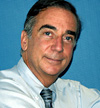
Donald Abrams
When people are diagnosed with a serious illness, they often experience emotional distress along with physical pain. At the UCSF
Osher Center for Integrative Medicine, providers place equal value on the biological, psychological, social and spiritual aspects of health and healing.
Osher Center practitioners take a holistic approach to healing - treating the whole person, not just the physical condition. They combine conventional therapies, such as chemotherapy, radiation and surgery, with alternative approaches, including acupuncture, massage and meditation.
With mounting research data showing clinically significant results with these treatments, Western medicine and prestigious academic health centers are increasingly embracing holistic modalities of care, including those practiced by Chinese healers for more than 5,000 years.
A growing number of Americans are turning to alternative therapies. In fact, more than one third of adults across the nation use complementary medicine, according to the National Institutes of Health. Now in its ninth year, the Osher Center, directed by Susan Folkman, professor of medicine, has been a steadfast role model in this health care revolution in San Francisco.
Founded at UCSF in 1997 as a result of the vision of Haile Debas, chancellor emeritus, and support from the Bernard Osher Foundation, the Osher Center is working to transform health care by conducting rigorous research on the medical outcomes of complementary and alternative healing practices; educating medical students, health professionals and the public about these practices; and creating new models of clinical care.
Located at the UCSF Mount Zion campus, Osher Center practitioners collaborate with physicians to develop individualized healing plans for patients suffering from a variety of diseases and disorders, from cancer to constipation.
The 17 practitioners, including integrative medicine physicians, acupuncturists, psychiatrists, massage therapists and wellness instructors, work together to meet the specific needs of each patient. At the center, practitioners respect the human capacity to heal, and focus on their relationship with the patient, forming an alliance to promote healing.
Providers at the Osher Center specialize in caring for people with cancer, chronic pain including back pain, women's health concerns and medically complex conditions.
Recently, veteran faculty member Donald Abrams was appointed as the new director of clinical programs. In his 23 years with UCSF, Abrams has been at the forefront of HIV/AIDS research and clinical care. He is currently the chief of the Hematology/Oncology division at San Francisco General Hospital and a member of the UCSF Comprehensive Cancer Center's Executive Committee.
Abrams completed an associate fellowship at the University of Arizona Program in Integrative Medicine, directed by Andrew Weil, in 2004, and has been part of the Osher Center clinical group since March 2005, providing integrative oncology consultations for patients living with and surviving cancer.
"At hospitals, we often lose sight of the patient, the person existing with cancer," Abrams says. "But at the Osher Center, I'm looking at the whole patient and not just the organ. If treatment is about expelling the evil while supporting the good, Western doctors expel the evil, while practitioners at the Osher Center support the good."
Abrams meets with patients for a 90-minute consultation, where he provides medical advice regarding nutrition, supplements and exercise. Being an oncologist, he understands how chemotherapy affects individual patients, and so designs treatment regimens accordingly.
"When someone gets a diagnosis of cancer, often they are highly functional and they suddenly feel a total loss of control," says Abrams. "Giving them lifestyle recommendations that they can do themselves empowers them, and that empowerment in and of itself decreases stress and leads to increased quality and, perhaps, quantity of life."
Abrams also encourages mind-body and spiritual activities, such as conscious breathing, meditation, guided imagery, tai chi, yoga and biofeedback.
"Mind-body activities enlist the potent energies of the mind to fight against the body's cancer," says Abrams. "I also think spirituality is important. For each patient, I try to understand what kind of belief system they have that allows them to get a sense of the order of the universe, and where they and their disease process stand."
After the consultation, Abrams refers his cancer patients to one of the traditional Chinese medicine practitioners because acupuncture is known to help with symptoms of chemotherapy, such as pain, nausea, vomiting and fatigue.
Another standout practitioner is Beverly Burns, who has been practicing Chinese medicine since 1991, and is part of a multidisciplinary research team for women with breast cancer at the UCSF Comprehensive Cancer Center. In January, Burns received the prestigious Jefferson Award for outstanding community service, and has often been called an "angel" by her patients.
Burns says that nearly 80 percent of cancer patients in the Bay Area use complementary medicine, and that with an emphasis on the patient-practitioner relationship, patients feel more empowered because they take a more active role in their overall wellness, with a greater focus on prevention.
"With the Western care model, you only go to the doctor when something is wrong, so it's a disease-driven, reactive system. It's separate and desperate care that is phenomenally expensive," says Burns. "With better primary care relationships, with an emphasis on prevention for the long haul, everyone will save money and the quality of care will dramatically improve."
Those who simply want to optimize their health can also make an appointment or sign up for a public class without a referral. Services and classes include: acupuncture and traditional Chinese medicine, herbal medicine, emotional wellness for women, meditation and guided imagery, mindfulness-based stress reduction, psychiatry and psychotherapy, massage therapy, spinal manipulation, tai chi and yoga.
The Osher Center also offers free public workshops on wellness topics, such as homeopathy and Ayurveda, as well as a class that prepares patients for surgery. All practitioners are credentialed by UCSF Medical Center.
Related Links:
Osher Center for Integrative Medicine
On the Spot: Dr. Abrams Responds

